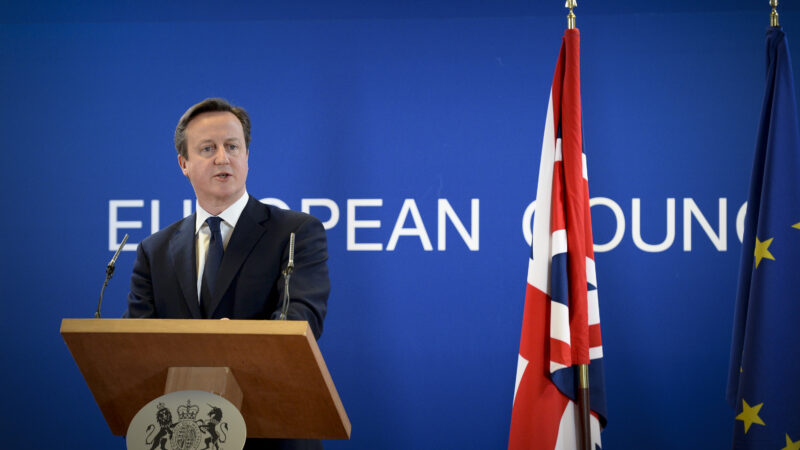Cameron’s “proper choice” in the EU referendum ought to mean there’s a third option on the ballot paper

So Cameron is in Riga, trying to charm fellow EU leaders that British exceptionalism a reformed EU is possible. News about it here. But one phrase particularly struck me from Cameron’s words – we’re going to give the people a “proper choice” he says.
The choice Cameron proposes is his negotiated, amended, weakened relationship between the UK and the EU, or Britain should leave altogether. This is no “proper choice” for people like me who, at the very least, would prefer no watering down of the UK’s relationship with the European Union, let alone no option for those who would actually advocate further integration between the UK and the EU (a point made by PolitiCrumb and Ralf Grahn on Twitter). There are rumblings from some on the left – the GMB Trade Union for example – that may switch to advocate a No vote if Cameron’s renegotiations are too harsh on workers’ rights (see this in the Indy about the different pro and anti camps).
So then, here is an idea for a “proper choice” in the referendum. Put two questions on the ballot paper – same style as was used in 1997 to establish the Scottish Parliament. Here’s some suggested wording:
Q1: Do you want the United Kingdom to remain a Member State of the European Union?
[ ] YES [ ] NO
Q2: Do you support the renegotiated settlement proposed by HM Government?
[ ] YES [ ] NO
A No to Q2 would simply leave Britain’s relationship with the EU as it is. Now I am aware that a renegotiated settlement is probably likely to be more popular (the “in but grumpy” option as Edmund Edgar rightly calls it), but at least a two-question referendum would allow a voter to separate EU membership (or not) from the way that Cameron plans to taint things with his assault on freedom of movement.
I think the two question idea is an interesting one but too nuanced for the electorate, who find all matters EU-related mind-bogglingly complex already (because in fact they are).
I think we will end up in a “Vow” type situation where Cameron comes back with a package of concessions and then we have to vote Out or In, with most of the Inners wanting the package honoured but having to trust everyone in the EU to do this. What happens next? will be a good quiz show question for this situation..
Steve: This is the final referendum they will not chance another and did not want to be forced to offer this one. In any case the trigger for a referendum on any future changes is under the control of the government not the people. That is why I pointed to the changes that have been made already when the government of the day did not believe the people should be consulted, they even decided to make us all citizens of the EU without our consent. In any case who is to say the European Union Act 2011 will still be on the statute books a year after the referendum. Both that act and this referendum were forced on an unwilling party leader trying to hold on to his position.
We cannot have another referendum held on spurious grounds that ignore the reality of what the EU actually is. On the continent they seem to be much more open about the aspirations of the project, here we like to pretend it is nothing more than a trading partnership that has gone a bit to far and a bit of tinkering will fix everything.
Whilst we remain in we are only debating a speed of travel towards a predestined end position, therefore we should vote not on what the EU is or what Cameron offers but on the eventual destination of the whole project.
Ken Adams: a vote to stay In is not at all a vote for all future Treaty revisions. The UK would reserve the same right as any Member State to object to a Treaty revision, or parts of it. More significantly our current law (the European Union Act 2011) requires a UK referendum in the event of any Treaty revision that transfers powers from the UK to the EU. All parties support that Act. So the British public would still be able to veto such changes. This also goes to Jon’s point that ‘more integration’ could also be on the table: you could always ask the British public in future if they wanted the euro or Schengen etc (which would also require a referendum vote under the Act). I think we know the answer already though.
But you are suggesting the EU is already a fully formed political project which it is not, therefore, a vote to stay in is a vote for all future treaty revisions which complete the structure. Because if we vote to stay in there will be no more referendum, just look at the changes since 1975 and all of them without any agreement of the people.
So do the true question needs to recognise the EU end position and ask if that is what we want to be part of.
Do you want to be part of a European political union would be a more honest question.